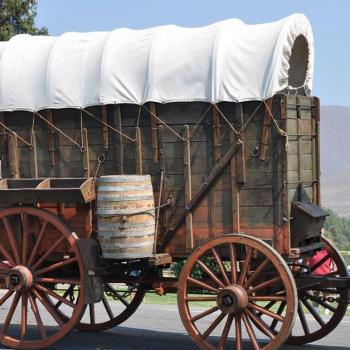I finally could bear it no longer and objected to the programming model on grounds of free agency. But no one in the quorum responded to my objection. They just went on to the next comment. There is no contradiction so blatant, no claim so outlandish, that it can't be swept under the rug in seconds by a class under the influence of one of the Three Sedating Sins. All it takes is a "Well, yes, sometimes life is difficult, but the gospel is true, and that's what really matters."
And that's probably true, but I'm not sure that maxim should let us ignore the huge paradoxes of life. This is where my own peculiarities come into play. This is where the essay throws off its veil of objectivity (like I've been fooling anyone) and shows you what I value.
I'm a strict adherent to the Thirteenth Article of Faith, especially the part that says, "if there is anything virtuous, lovely, or of good report or praiseworthy, we seek after these things." I don't follow this rule because I'm righteous. I follow it purely out of a survival instinct. It is paramount to my spiritual survival that I am shown, on a regular basis, that the world is a much larger place than I had originally thought. I need periodic inoculations in the Total Perspective Vortex as described in Douglas Adam's The Hitchhiker's Guide to the Galaxy. In case you haven't read this series of science fiction novels, which I consider to be some of the greatest contemporary works of philosophy we have, the Total Perspective Vortex can extrapolate the entirety of reality from something as insignificant as a piece of fairy cake. The Vortex is used to execute especially dangerous criminals by showing them precisely how small they are in comparison to the rest of the universe. The effects of this "reality check" annihilate the victim.
Being human, I naturally tend to interpret the world as being smaller than myself, as a place I have some measure of control over. And being a lower breed of academic, I'm especially prone to thinking that I'm smarter than everyone else. When I suddenly realize that the world is larger than I had once thought, my small mind is horrified but also, strangely, comforted. As the playwright David Mamet writes in Three Uses of the Knife, "Myth, religion, and tragedy . . . awaken awe. They do not deny our powerlessness, but through its avowal they free us of the burden of its repression" (p. 15).
For example, in the movie Seven, Brad Pitt's character, a homicide investigator who has contemptuously treated his quarry (a man who kills serially according to the seven deadly sins, played by Kevin Spacey), is caught in a position where he must either help fulfill the killer's plan or acknowledge the killer's superior intelligence. The killer literally has Pitt's wife's head delivered by courier. Pitt has a gun, and the killer is in chains. He knows that Pitt has an explosive temper and will most likely give way to wrath, the last deadly sin, for which there has not yet been a murder committed. It is an ending that never fails to open my soul to the core. To me, Pitt is everyman. At some point each of us will find ourselves in Pitt's shoes: the world will be too big for us, and it will demand an answer. What is really inside of us? No tips or trix will suffice.
As the screen fades, Morgan Freeman (Pitt's partner) says, "Ernest Hemingway once wrote, ‘The world is a fine place, and worth fighting for.' I agree with the second part."
Other works of art have done the same thing for me: Levi Petersen's The Backslider, Graham Greene's Heart of the Matter, Sharon Olds's The Gold Cell, the movies Monster (another serial-killer flick) and My Dinner with Andre, and Gustav Mahler's Symphony of a Thousand.
What these pieces of art offer me are trips into the depths and heights of life, to places where the paradoxes become almost unbearable. I say "almost" because, while experiencing a piece of art, I am not actually in the situations, only by proxy. It's a strange kind of temple work: fictional characters performing initiatories and endowments for living, breathing people. From time to time, the scriptures do the same thing for me, especially the Old Testament and the sayings of Jesus. The juxtaposition of God with the horrors of Joshua's war tactics never fails to blow my mind, nor does Jesus' contention, "Consider the lilies of the field, how they grow; they toil not, neither do they spin: and yet I say unto you, That even Solomon in all his glory was not arrayed like one of these" (Matthew 6:28-29).
This is the mission of religion for me. To take me to those places, to help me open my soul to the hugeness of the world. To encounter the paradoxes. To contemplate the heights and the depths. To push rationality till it breaks and then to rocket into mystery. Who knows where we'll land? As Kierkegaard put it,
When I have to think of Abraham, I am as though annihilated. I catch sight every moment of that enormous paradox which is the substance of Abraham's life, every moment I am repelled. . . . [W]hen I reach the height I fall down" (Fear and Trembling/The Book on Adler, p. 24).




